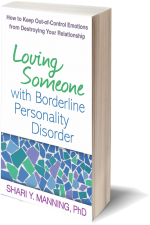 |  | Loving Someone with Borderline Personality Disorder
Author: Shari Y. Manning, PhD
Publisher: The Guilford Press; 1 edition (August 15, 2011)
Paperback: 253 pages
ISBN-10: 1593856075
ISBN-13: 978-1593856076



|
Book DescriptionThis is a "how to" book that will help anyone that is in a troubled relationship with a person suffering from Borderline Personality Disorder. Despite the hurt, exasperation, and confusion, many people find themselves unwilling to leave BPD relationship. Perhaps they are tied to the person with BPD by blood, and they're not about to abandon their daughter or brother or marriage vows. Or they still see evidence of the person they once found so appealing, and that's who they want to hold on to. Psychologist Shari Manning understands what it means to care deeply about someone who is afflicted with this serious illness and offers practical tools to help in the day to struggles. In one part of her book, Manning, for example, discusses ways to handle a person that is upset. While the process appears complex in its description - with a little practice it can easily become second nature. It is pretty easy to validate someone who is not upset. Validating a person who is emotionally aroused is a skill. Here are the six aspects of validating someone that is upset.
Stay Awake "Staying awake" means pay attention, being attentive, asking questions. At its most basic, all you really have to do is focus, listen and nod yes, lean forward. It's critical not to be judgmental or dismissive about what the person has experienced - these will be taken as forms of criticism that you view something as "wrong" or "bad". A person with BPD can often see the changes in our faces when we have judgmental thoughts.
Accurate Reflection Accurate reflection requires you to communicate that you've heard the person. At its most basic, just repeat, verbatim, what the person said-- though it can be better to paraphrase so you don't sound like a parrot. This helps because it communicate to the person that what he is experiencing is universal enough for you "to get it" and that you are listening to what they are saying.
Stating the Unarticulated This is about demonstrating your active involvement in the discussion. It requires you to create a hypothesis about what you believe the person is not telling you. You can do this with a question or a supposition - ask if "_____" is accurate. This works especially when the person is dysregulated. You have to be willing to be wrong though, which shows that you haven't quite got it yet, so then ask more questions.
Validating in Terms of Personal History or Biology We are what's happened in our lives. On some level, all our actions make sense based on our history and experience. If you ever lived through a tornado, you would have a higher response to the warning sirens than others. Letting a person know that their behavior makes sense based on their past experiences shows understanding. Our physical problems also impact (thus explain) how we behave. A person who has a bad back has difficulty sitting for long periods of time. Making reference to mitigating circumstances shows understanding and empathy.
Normalizing One of the most important things to communicate is that others would have the same response. People with BPD have the ongoing experience of being different - outsiders in their own worlds. When you normalize what they are feeling you find a way to communicate that what is going on for the person with BPD is the experience of being human, that anyone in the same situation could feel the same way. This is powerful. Some key phrases that can be used are:
"We all have moments when we feel that way"
"Of course you think that: anyone would in your situation"
"I would feel that way too"
"You know that is such a normal reaction"
"It makes sense that you did that. We all have those moments"
Of course, there are some things you can't normalize, such as suicidal behavior. Don't normalize things that are clearly not normal.
Radical Genuineness The key to
validation is to be genuine. To be radically genuine is to ensure that you don't "fragilize", condescend, or talk down to the person you are trying to validate. You don't want to treat them any differently than you would anyone else in a similar situation. They aren't fragile, and to treat them as such can be seen as condescending.
According to Manning, there are really good reasons for changing your responses. The reason for
validation is to dampen emotional arousal.
About the AuthorShari Manning, Ph.D., is the founder of the South Carolina Center for Dialectical Behavior Therapy, a comprehensive clinic that offered standard outpatient and intensive DBT treatment for adults and adolescents. She is the former President/CEO of Behavioral Tech, LLC and Behavioral Tech Research, Inc. Manning has supervised therapists at the Behavioral Research and Therapy Clinics at the University of Washington and the University of South Carolina as well as supervising therapists and programs at the SC Department of Mental Health and South Carolina Department of Corrections. She also consults for state and private mental health programs at all levels of client care, including forensic and criminal justice settings.
Her research includes investigations of the efficacy of DBT with incarcerated women with borderline personality disorder (BPD) and with adult women with co-morbid BPD and eating disorders. Dr. Manning has written several published chapters and articles on DBT and its implementation.





 Poll
Poll
